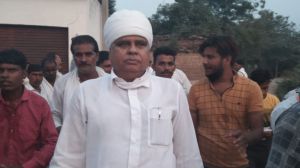A law like this
The day after Delhi High Court8217;s judgment on the December 13 case, the FINANCIAL TIMES framed questions about police misuse of POTA in ...

The day after Delhi High Court8217;s judgment on the December 13 case, the FINANCIAL TIMES framed questions about police misuse of POTA in India and suggested the need for police reform. Human rights groups, it pointed out, have long argued that the anti-terror law allows the police to detain people indefinitely even where normal evidence is lacking. 8216;8216;If you have a law like this, which you shouldn8217;t, then you must ensure the police are independent from political interference, which they aren8217;t8217;8217;, columnist Kuldip Nayar summed it up for the paper, after the court overturned last year8217;s death sentence to S.A.R. Geelani.
The paper cited the misuse of the law in Gujarat where the Modi government has detained 240 people under POTA after Godhra and the anti-Muslim pogrom. 239 of the 240 are Muslim.
Knowledge 038; power
Mahathir Mohamad8217;s exhortations at the world8217;s largest Muslim organisation last week still ripple in the western media. Jews control the world, Malaysia8217;s outgoing PM told heads of state at the 57-member Organisation of the Islamic Conference, and Muslims should learn from them. But this week, another exhortation to the 8216;8216;Muslim world8217;8217; 8212; of a very different kind.
There are no dark suggestions of sinister conspiracies in the second Arab Human Development Report recently released in Jordan. AHDR 2003 is written by specialists from across the Arab region and published by the United Nations Development Programme UNDP and the Arab Fund for Economic and Social Development AFESD. The ECONOMIST predicted that the 8216;8216;candid language and shocking statistics8217;8217; of the report, which focuses on the poor Arab performance in generating knowledge and stimulating inquiry, will stoke furious debate in the region. The report is a 8216;8216;cry for freedom8217;8217;, it said.
Egypt8217;s AL AHRAM WEEKLY described it as 8216;8216;Reclaiming the Initiative8217;8217;. The paper recalled that when the first AHDR was released, Arab critics argued that it failed to give sufficient weight to the Arab-Israeli conflict as an obstacle to human development in the region and was used to support anti-Arab policies internationally. Writers of the second AHDR were well aware of this context, the WEEKLY pointed out. Yet, 8216;8216;8230; to leave the initiative to others would be the more ominous choice. Self-reform stemming from open, scrupulous and balanced self-criticism is the right, if not the only, alternative to plans that are apparently being drawn up outside the Arab world for restructuring the area8230;8217;8217;.
AHDR 2003 defines the mass media as the most important agent of the public diffusion of knowledge.
Three Laureates
One reason why it is so important to close the educational gaps, said Amartya Sen, is to make the world more secure. Sen was speaking to the Commonwealth education conference in Edinburgh; this week the GUARDIAN carried the full text of his speech. 8216;8216;If we continue to leave vast sections of the people of the world outside the orbit of education, we make the world not only less just, but also less secure8217;8217;.
Sen spoke of the greater precariousness of the world we live in, especially since September 11 and counted out the ways in which schooling can play a 8216;8216;powerfully preventive8217;8217; role in reducing human insecurity. One, illiteracy and innumeracy are forms of insecurity in themselves, bringing as they do the 8216;8216;certainty of deprivation8217;8217;. Two, basic education is critical in a rapidly globalising world; it largely determines nations8217; participation in the global economy. Three, educational neglect can lead to other kinds of deprivation 8212; when people are illiterate, their ability to exercise their legal rights can be severely limited. This distances the deprived from the ways and means of fighting out of their deprivation and leads to insecurity. Four, illiteracy can deprive the political underdog of the opportunity to gain a political voice.
But merely closing the gaps won8217;t be enough. Sen also touched upon the necessity for curricula to be non-sectarian and non-parochial. 8216;8216;Indeed, the nature of education is quite central to peace in the world8217;8217;
8226; Peace is possible only when human rights are respected, Shireen Ebadi told Amir Taheri, editor of French quarterly POLITIQUE INTERNATIONALE. Taheri was interviewing the 2003 peace laureate and Iranian human rights lawyer and activist, for America8217;s WEEKLY STANDARD.
Ebadi saw her prize as a message from the international community 8216;8216;to the people of Iran, especially to women and beyond them, to the Muslim world8230; that fighting for human rights in Iran is not a lonely pursuit8217;8217;. In response to a question, she claimed that Iran is different from Iraq and Afghanistan. Because 8216;8216;There were no mechanisms for internal change in Iraq and Afghanistan. In Iran, there are.8217;8217;
8226; In the GUARDIAN again, Joseph Stiglitz, also a Nobel prize winner, wrote as someone who was 8216;8216;intimately involved in economic policy making in the US8217;8217;. He said he has always been struck by the divergence between policies that America pushes on developing countries and those it practices at home.
Stiglitz gave examples. Free marketers rant against industrial policy, but in the US the government has actively supported new technologies. The US federal government built the first telegraph line; the US military developed the internet. Much of modern American technological progress is founded on government-funded research in bio-technology and defence. While it advises other countries to privatise social security, America8217;s own public social security system is extremely efficient. 8216;8216;Occasionally, America has experimented with free-market ideology and deregulation 8212; sometimes with disastrous effects8217;8217;.
For India, Mexico and Brazil, Stiglitz had a new message: don8217;t strive for a free-market economy which has never existed. Look closely, not at what the US says, but at what it did when it emerged as an industrial power, and at what it does today.
- 01
- 02
- 03
- 04
- 05































